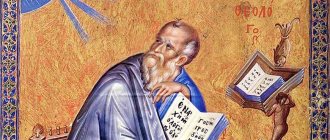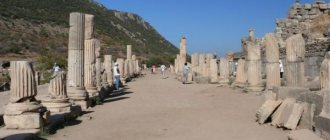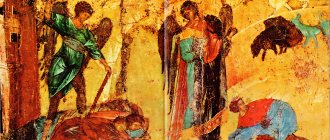The Mystery of Ecclesiastes
Almost every Book included in the biblical canon has an indication of the name of its author. Therefore, when introduced to the Book of Ecclesiastes, many have no doubt about who wrote it: “Ecclesiastes is probably the name of some prophet.” Is this judgment correct? What does the book of Ecclesiastes say and why is it important for Christians?
Biblical King Solomon (medieval Catholic fresco)
Ecclesiastes: what or who is this?
In the original Hebrew the text is called Kohelet - “speaker in the congregation”, “preacher”. The literal translation in Greek is Ecclesiastes (“Εκκλησιαστής”). Thus, Ecclesiastes is not a proper name. In Russian Orthodoxy, by tradition, it is the Greek word that is preserved. So the full title of the book of the Synodal translation states: “The Book of Ecclesiastes, or the Preacher.”
"Preacher. This is a kind of new quality compared to a prophet, teacher, king, judge. Bible prophecy, teaching, and storytelling are now perceived as preaching. The teacher is talking about something, about someone, the preacher is saying something to someone” (Archpriest Gennady Fast).
If Ecclesiastes is not a name, then who is the author of the Book?
There is still no generally accepted opinion about the authorship and time of writing of the book. Although Orthodox Tradition believes that this creation belongs to the Jewish king and prophet Solomon (10th century). It is believed that he wrote it at the end of his long life. This is indicated by the words of the author himself, who calls himself the son of David and king in Jerusalem.
However, in the 17th century, the Dutch theologian Hugo Grotius expressed doubts about the authorship of King Solomon. This opinion was supported by many Protestant scholars who doubt the authenticity of the Book. Many assumptions have been made about the time of its writing. In support of their judgments, a description of disasters unknown in the fate of Solomon was given. The use of some words in the Book of Ecclesiastes was considered unusual for the Solomon era. Thus, the German historian Friedrich Delitzsch indicated the time of compilation of the Book as the period from 464 to 332 BC. The German historian Heinrich Graetz attributed it to the 1st century BC.
For Orthodox Christians, the question of the authorship of the Book of Ecclesiastes is of secondary importance. The main thing here is the very meaning of the Book, its content and teaching.
Summary
Major events in the book include the story of the acquisition of wisdom, the knowledge of folly and madness, personal dissatisfaction and discontent in the author's life, and the excellence of the worship of God. The preacher speaks to future generations about the importance and greatness of wisdom. Any earthly joys and meaningless entertainment lead to emptiness and dissatisfaction. People of all generations strive to find happiness anywhere, sometimes in places where it can never be found. They experience various disappointments that lead to dead ends and emptiness in life. If life is not focused on serving and honoring God, it is aimless and useless. King Solomon vividly reveals how he again taught himself to acquire wisdom and passed on his explanations and observations to other generations. Faith teaches him that God created everything beautiful for His purposes “He made everything beautiful in its time, and put peace in their hearts, although man cannot comprehend the works that God does from beginning to end” (3:14). Every person should accept everything from God, including his own limitations, as God’s gift in life. At the end of the book, the preacher concluded that the most important thing in life is to honor God and revere Him.
What is the Book of Ecclesiastes about?
The book of Ecclesiastes stands out in the context of the Old Testament Scriptures. There are no bright and distinct confessions of faith in God. She is devoid of prophetic predictions and admonitions.
The Book of Ecclesiastes presents the preacher's reasoning about the vanity of the world. The leitmotif in it is the words “vanity of vanities.” According to Ecclesiastes, everything repeats itself in the world. One generation of people is replaced by another. After every day comes night, after night comes day. Water flows in a river, makes a revolution and returns to its source (Book of Ecclesiastes, 1:4-7). Because of the vanity of the world, a person has no meaning or benefit in anything. Even something new that attracts a person’s attention has, in fact, already existed and been encountered by previous generations (Book of Ecclesiastes, 1:9).
Such judgments seem to many to be contrary to the very spirit of Holy Scripture. But for Orthodox believers such a contrast is not relevant. Exposing worldly vanity, which removes a person from the Creator, helps to look at many things correctly and calmly. That is why this Book belongs to the teaching books of the Bible.
“In all other writings, historical and prophetic, their goal tends towards something else that is not at all useful for the Church. For what need is there for the Church to study exactly the disastrous consequences of wars, or who were the princes of the nations, the founders of cities, who moved away from whom, or what kingdoms will disappear in the future, how many such marriages and births of children are carefully mentioned, and all this like, What information can be gleaned from each scripture? Can so much help the Church in the cause of piety?
And the teaching of this book refers only to the way of life that the Church requires, and teaches what a person can do to succeed in a virtuous life. For the purpose of what is being said here is to place the mind above the senses, finally leaving behind everything that seems great and brilliant in beings, to turn the soul to what is inaccessible to sensory understanding, to perceive the desire for what is unattainable for the senses” (St. Gregory of Nyssa, 4th century ).
Cheerful pessimism
“He who does not see the vanity of the world is vanity himself,” wrote Pascal. Ecclesiastes is not fussy; he realized this vanity and rose above it. Without pity, he deprives a person of all illusions in this world. Yes, we cannot know what we are destined to work for. Yes, our joy and our earthly contentment are a sign of our stupidity. And the knowledge we have acquired and all human wisdom only multiply sorrow. And even the search for truth and justice on this earth is nothing more than another futility - the author writes directly about this:
There is such a vanity on earth: the righteous suffer what the deeds of the wicked would deserve, and the wicked suffer what the deeds of the righteous would deserve. And I said: and this is vanity! (8:14).
Everything is equally meaningless and insignificant in the face of death. However, where obvious contradictions arise in Ecclesiastes, their tension is always removed by the name of God.
Here are just a few examples:
Go therefore, eat thy bread with gladness, and drink thy wine with gladness of heart, when God delighteth in thy works (9
:7);
Just as you do not know the ways of the wind and how the bones are formed in the womb of a pregnant woman, so you cannot know the work of God, who does everything ( 11
:5); Enjoy life with the wife you love all the days of your vain life, and whom God has given you under the sun for all your vain days; for this is your portion in life and in your labors, as you labor under the sun (9:9).
It is not given to a person to know the fate of what he sowed, not to mention how his descendants will dispose of his inheritance. But God, who is above everything, knows this, and that is enough.
“We see how the negation of meaning “there is no benefit,” writes culturologist Mikhail Epstein in this regard, “transforms into the affirmation of life “there is nothing better than.” This is not a contradiction at all, but the deepest truth of faith as doubt, as the denial of positive knowledge. A person does not know why his works were sent to him, but that is why he knows that nothing else, nothing better has been given to him. This anticipates the famous “I believe because it is absurd” attributed to Tertullian. The thought of Ecclesiastes, like the later thought of Tertullian, Dionysius the Areopagite and Søren Kierkegaard, moves <…> from absurdity and despair - to hope, from vanity and languor of the spirit - to faith.”
When a person, so clearly aware of the futility of all his efforts, fully accepts the will of God, a “position of cheerful and active pessimism” is born, in the words of the same Mikhail Epstein. This is life - despite its absolute meaninglessness - with absolute trust in God. Man is not given anything else.
This, if you like, is the whole “canonicity” of the Book of Ecclesiastes. Faith is unfounded, the author tells us. It is nourished not by the formal performance of rituals “according to a schedule,” but by the simplicity of walking before God - this is a laconic and at the same time infinitely deep call to Old Testament man. And the Christian worldview is the same joyful and active pessimism.
The believer knows: the Kingdom of Heaven on earth is impossible - all the peoples inhabiting it will never enter the Church, a minority will always listen to it, and universal justice is possible only in utopian dreams. Christian pessimism is a sober view of the world, cleared of illusions.
But at the same time, he is joyful, moreover, active, because everything that is given to a person in this life is from God, and His grace is poured out on the believer just like that, in addition to his imaginary or real merits. And this means that a Christian has no right to give up. He knows that in the bustle and fleetingness of earthly existence there is always the prospect of eternity and that one can rise above the fatigue and routine of everyday life, like Ecclesiastes, if one remembers that only in God can peace and happiness be found. This is a simple formula.
I recall the words of Blessed Augustine, spoken by him after the Incarnation: “Our heart knows no rest until it rests in You.”
Is Ecclesiastes a sage or a pessimist?
What prompts Ecclesiastes to call all worldly affairs - righteousness, wisdom, wealth, prestige, fun and even life itself - vanity? Is Ecclesiastes really a hopeless pessimist?
“Yes, our life is filled with activities and events, constant anxiety, fear of the future. But the Book of Ecclesiastes reminds us that all our problems and worries really have no value: on the day we die, everything in the world will remain the same. What then is eternal and unshakable, on which a person can truly rely? He who has found the answer to this question follows the true path of wisdom, says Ecclesiastes. And this path is in the God-man” (Archpriest Stephen Freeman).
Everything in life is “havel”
The book of Ecclesiastes immerses the reader in the gloomy, hopeless world of a man who was “successful” all his life, but in his declining years he realized that everything in life is vanity and there is nothing in him worth making an effort for. The word that appears in Ecclesiastes more than 30 times is the word “havel”, which is translated as “vanity”, but a more accurate translation is “steam”, “sigh”, that is, practically - “nothing”, “emptiness”, “air” "
For the hero of the book, all human life, all his works, everything that happens, has happened and will happen around him is all just “havel”. And even human wisdom also means nothing in the face of death, for “in much wisdom there is much sorrow; and whoever increases knowledge increases sorrow” (Eccl. 1:18). That is, in the language of modern times, “many knowledge brings many sorrows.”
Is there really “nothing new under the sun”?
Everyone is familiar with the catchphrase: “Everything new is well forgotten old.” It is unknown who exactly uttered this thought in this particular form. But the same meaning was expressed by Ecclesiastes: “... there is nothing new under the sun” (Book of Ecclesiastes, 1:9).
What seems new to us has already come into the world more than once. According to the law of endless circulation, everything repeats itself. Therefore, a person is simply not given anything truly new to see.
“What can happen subsequently that has not already been done or done by people? What is new, what has never been known from experience, what would be worthy of remembering? I think that there is nothing about which one could say something fresh, or, by comparing, find something new, completely unknown to the ancients” (St. Gregory the Wonderworker, Neocaesarea, 3rd century).
Many Christian theologians have tried to explain this judgment of Ecclesiastes. For example, in the famous Christian philosopher Origen (185-254) you can even find a theory about the existence of several worlds that change over time. However, such a teaching was rejected by the Church.
Key Verses
Ecclesiastes 2:12, 14 “Then I began to meditate on wisdom and on madness and foolishness...And I saw that wisdom is better than foolishness, just as light is better than darkness. A wise man sees clearly where he is going, but a fool wanders in the dark.”
Ecclesiastes 3:1 “For everything there is a season, and for every task under heaven there is an hour.”
Ecclesiastes (12:1) “ Remember your Creator in the days of your youth, before hard days come and the years approach about which you will say: “I find no pleasure in them!” »»
Ecclesiastes (12:13-14) “ Now that everything has been heard, here is the conclusion: fear God and keep His commandments, for this is all that is important for a person, because God will bring every matter to judgment, including what is hidden , be it good or bad."







